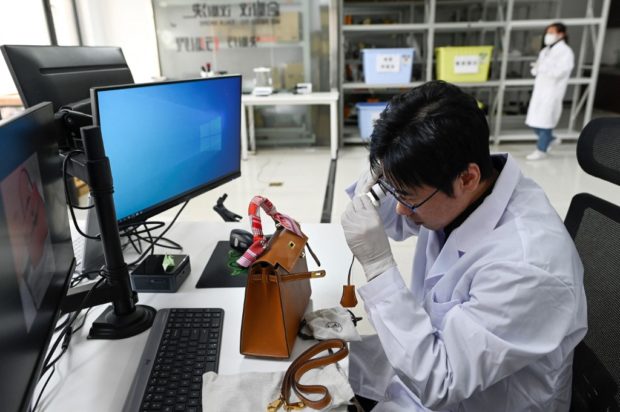Finding fakes: Sign up for this Chinese course

This picture taken on March 24, 2021 shows Zhang Chen, founder of the Extraordinary Luxuries Business School, verifying the authenticity of a watch at the Beijing Extraordinary Luxuries Technology company in Beijing. – It’s the world’s biggest market for luxury goods — and their counterfeit equivalents — so an expert eye for telling a bona fide Chanel hand bag from a bogus one is a skill set in hot demand across China. (Photo by WANG ZHAO / AFP) / TO GO WITH AFP STORY CHINA-ECONOMY-LUXURY-FAKES,FOCUS BY HELEN ROXBURGH
BEIJING — It’s the world’s biggest market for luxury goods — and their counterfeits — so an expert eye for telling a bona fide Chanel handbag from a bogus one is a skill set in hot demand across China.
Enter the “luxury appraiser,” an eagle-eyed differentiator of real from fake, trained to triage handbags, belts and garments for dodgy serial numbers, stitching and logos.
China’s factories churn out huge quantities of luxury goods, much of which is destined for a domestic market worth about 4 trillion yuan ($620 billion), according to market researchers UIBE Luxury China.
Now the secondhand luxury market is also booming as those unwilling to part with thousands of dollars for a handbag seek out the prestige at a discount price.
But a vast shadow trade in counterfeits lies in wait for the bargain-hunters.
Many are fooled by “good imitations with little difference” from the originals, said Zhang Chen, founder of the Extraordinary Luxuries Business School, who tools his graduates with the gift of detecting fakes.
His seven-day course teaches students how to detect forgeries, value secondhand goods and learn the skills needed to appraise luxury products.
And while the fee is $2,400, Zhang says it is a price worth paying as it provides a foothold in a secondhand luxury market that is only just taking off.
China’s secondhand luxury market value reached 17.3 billion yuan in 2020, almost double the previous year, according to consultancy Forward Business Information.
“Chinese people buy one-third of the world’s luxury goods, but the circulation rate of three percent is far below the 25-30 percent in Western countries,” he said, referring to the percentage that is later resold.
Tricks of the trade
Zhan drills the rules of luxury into students who are hooked onto his every word.
“The lining of a black Chanel handbag must be pink,” he says.
Trainees check ID cards on handbags from the French luxury fashion chain under a special ultraviolet light.
“Two letters will light up and that’s the secret,” said Zhang, who learned his own skill appraising luxury goods a decade ago in Japan.
Knowing which letters in the Chanel logo use a rectangular rather than square font can “detect a third of the fakes on the market,” he added.
His class is all affluent but from a variety of backgrounds, including the former editor of a fashion magazine from Shanghai and a bartender looking for a fresh start after his business was hit by the COVID-19 pandemic.
“I realized that secondhand luxury bags could be sold at a very good price,” said 31-year-old stock market trader Xu Zhihao. —AFP